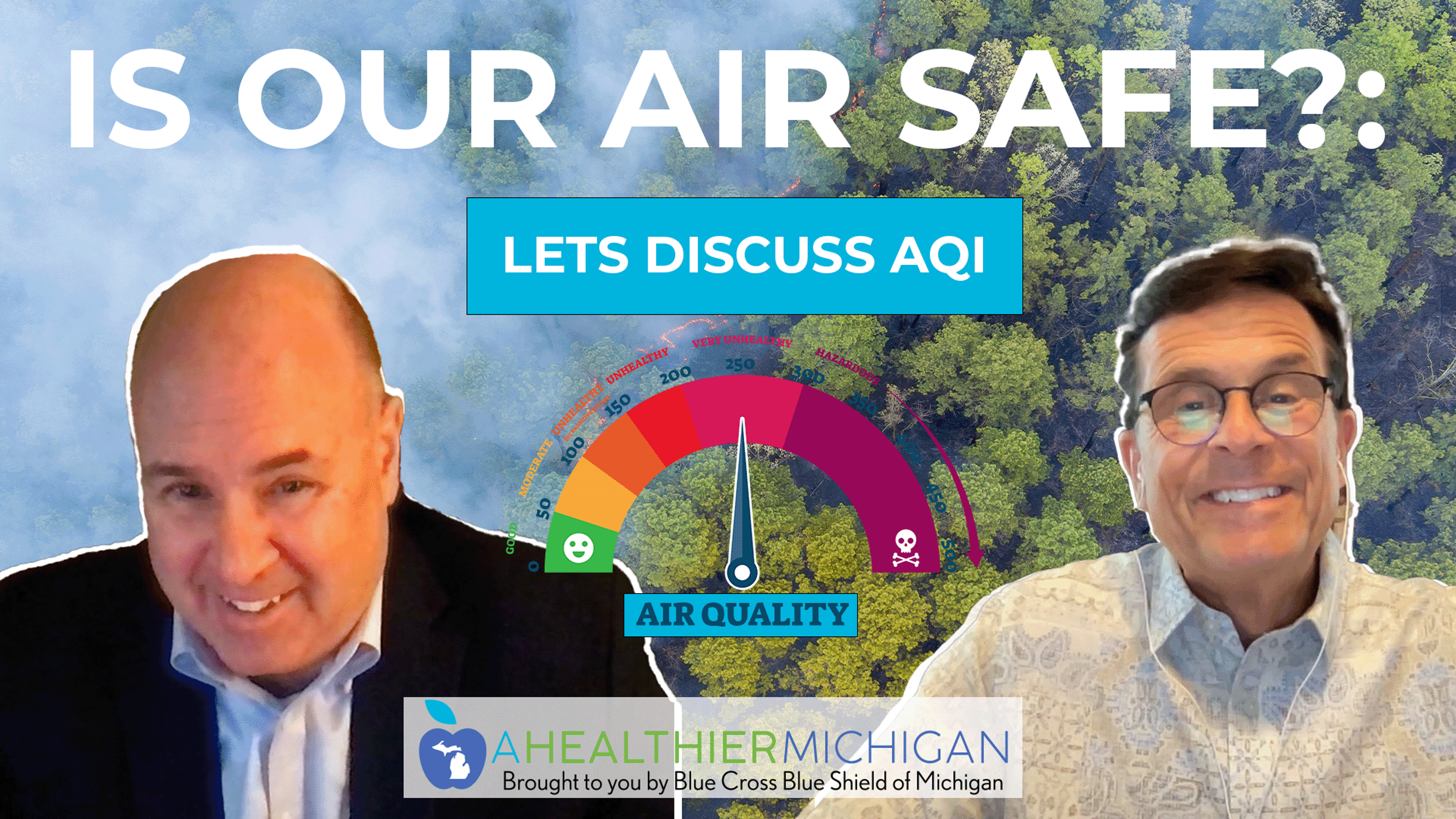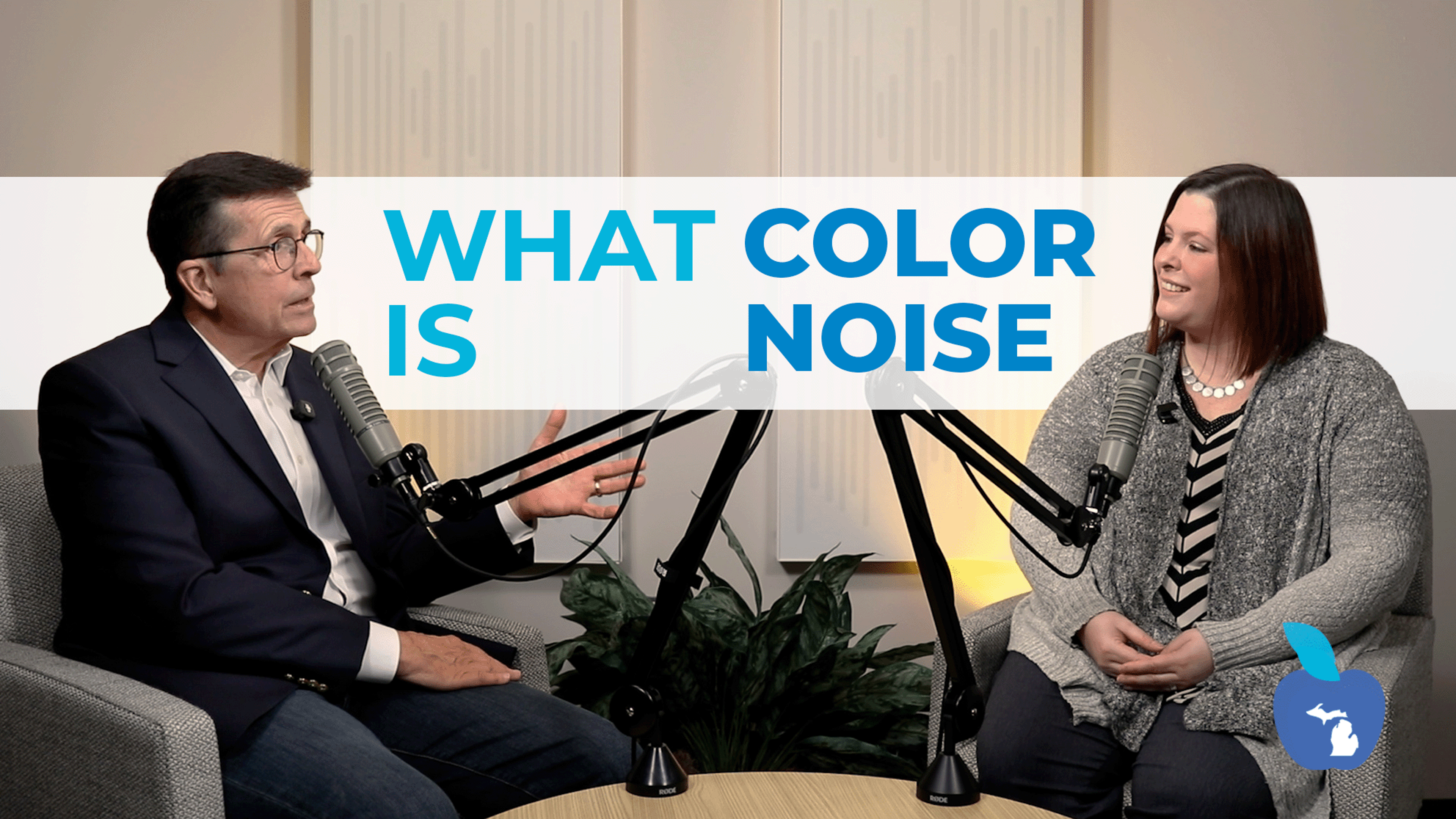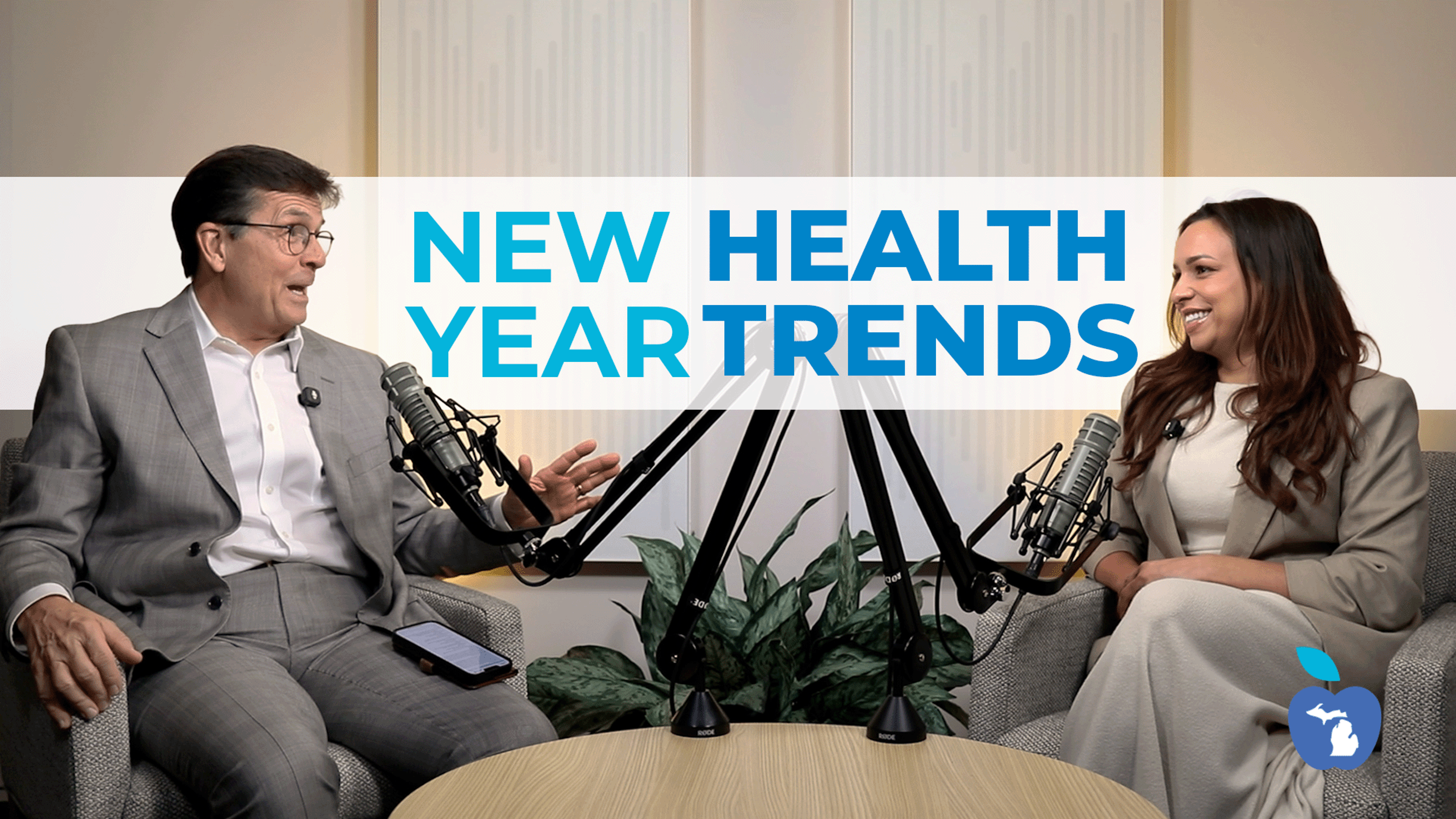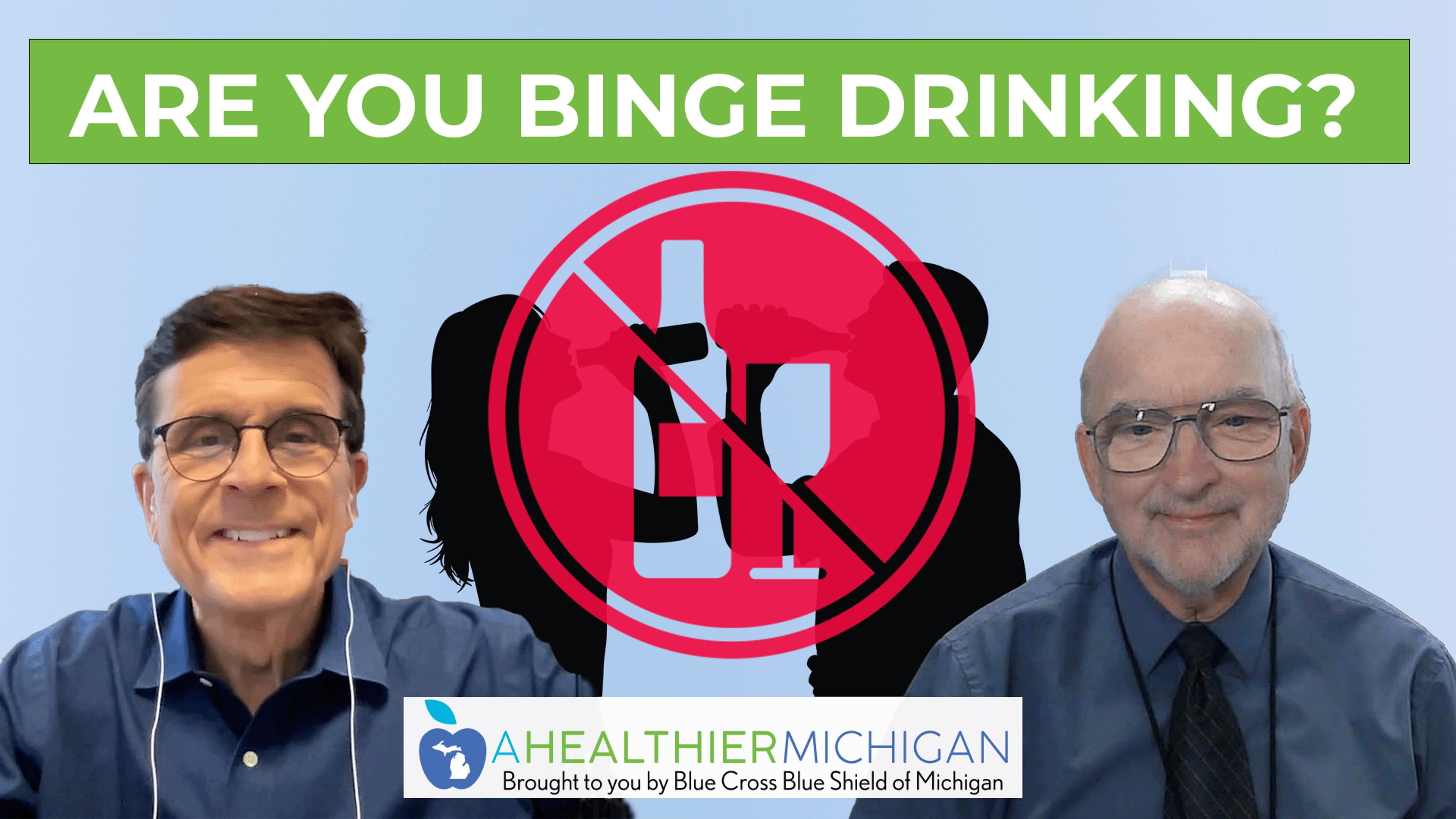From Green to Purple: What is the Air Quality Index?
| 1 min read

00:00
00:00
About the Show
On this episode, Chuck Gaidica is joined by the Clinical Director of Blue Care Network, Dr. Peter Graham. Together, they talk about the AQI, what it is and how it can help prepare you for the day.
In this episode of A Healthier Michigan Podcast, we explore:
- How to read the AQI
- Who is most affected by air quality
- What changes air quality
- What you can do to help yourself
Transcript
Chuck Gaidica:
The air around us is always changing. It's based on natural, and human factors like wildfires, traffic, wind patterns, and even pollen. And while most of us may check a weather app, or check TV for a weather forecast, we want to see if it's going to rain, or shine, but we often overlook something that's just as important, the air quality. That simple number on your screen can tell you a lot about how safe it is to go out, and exercise, let your kids play outside, or even relax in the sun. This is A Healthier Michigan Podcast, episode 184, and coming up we're diving into how the air we breathe every day can affect our physical health, and what small habits we could all have to keep us all safe, and protected. Welcome to A Healthier Michigan Podcast. It's a podcast dedicated to navigating how we can improve our health, and well-being through small, healthy habits that we can start implementing right now.
I'm your host, Chuck Gaidica, and every other week you may know, we sit down with a certified expert. We explore topics around nutrition, fitness, and today it's all about the stuff we breathe every single second of the day. On this episode, we're talking about the air quality index. This may be a number that you see. It may fly by you in your daily affairs, but what does it mean to our bodies how poor air quality can maybe impact our lungs, or our heart, our immune system, even our ability to stay active. So, joining us today is Dr. Peter Graham, clinical director for Blue Care Network. How are you, doctor?
Dr. Peter Graham:
I'm excellent, thank you.
Chuck Gaidica:
Good. It's great to see you. So, we think that-
Dr. Peter Graham:
Likewise.
Chuck Gaidica:
Thank you. So, maybe we think we're away from a city. We don't have the smog issues. We used to hear about that word a whole lot, but it doesn't matter whether you're living in the burbs in the urban area. It seems like we're hearing about this a lot more, and I suspect for us in Southeast Michigan, the whole state of Michigan, we're hearing about this more because we're hearing more, and more about wildfires from our state, from Minnesota, from Canada, from places around us playing a bigger role than before. So, let's talk about the details of this stuff as we dive in. What is the air quality index, first of all?
Dr. Peter Graham:
Yeah, thanks. AQI Air Quality Index. You can think of it as a one-stop shop for understanding what air quality looks like where you live, or in the region where you live. It's a metric that's used in common globally. It was agreed to, or the standards were agreed to it through the World Health Organization. Each country has essentially its own version of it all. They're very, very similar. So, it's a way to compare apples to apples, what the air quality looks like at any given point in time, and in a given geographic region. It translates into both a number, which we can unpack a little bit as we go through the discussion. It also translates into a graphical, which helps folks understand, or intuit what it really means. So, both the number itself, it's a scale that goes from zero up to 500.
Chuck Gaidica:
What are we looking for that indicates caution? If I assimilate it to a stoplight, am I looking for yellows, and reds, and that means, oh, pay attention?
Dr. Peter Graham:
That's exactly it. So, it's both numbers, and colors, and mostly to aid folks just kind of intuitively understanding what it means. It starts with zero to 50 is green. That's like imagine you're on top of Pike's Peak, crystal clear air as far as the eye can see nothing. It might be a little chilly, but it's very clear, so that clean air, easy to breathe. And then yellow to orange to red, to dark red, purple. When you're getting up in the really high range, the 200 to 300 range, and beyond 300 up is really hazardous. That would be being in a really heavy industrial area, poorly filtered, ventilated mean like sitting right next to a smelting factory, or a coal refinery, or something like that where it's really, really dense.
Chuck Gaidica:
Well, we see that you just drive south instead of going up north, which we get to say in Michigan, but if you're coming from the south, you'll see more factories along the Detroit River, et cetera. So, some people may have to live close to some of those factories, and things that produce this often, but now we're hearing about particulate matter stuff that's inbound from other states, even other countries. So, some of this, to me it seems like it's very contextual. I've got to know myself a little bit to know if I should be concerned because to be fair, in my own lifetime, I've never gone out, even when that scale has been increased, that number has gone up. I have never keeled over, I've never felt like I can't breathe. To be also fair, I'm not in the midst of a smoky event like being near a campfire, but I see a great sunset from it. I may see a cool looking moon, but I'm not seeing a haze immediately outside of my driveway when I take the dog out for a walk. So, why should I be concerned?
Dr. Peter Graham:
Yeah, that's a really good question. Just going to generally point out within the last couple of weeks actually, some of the worst affected areas in Michigan were up close to the Straits of Mackinac, and the Eastern UP.
Chuck Gaidica:
Oh, yeah, you're right.
Dr. Peter Graham:
It is kind of turning things on its head. We get courtesy of Clean Air Act, and a few things. We've gotten very used to clean air everywhere, and you're right, we just kind of take it for granted. Anyway, who should KSO, brings you to right question who should be paying close attention to it? The initial answer is really all of us, and we probably notice it. I'm guessing a lot of folks, even if they didn't immediately feel the dire effects like you described, probably over the last couple of weeks, we've all noticed our eyes burn a little bit more, and may feel like you spent too much time on the computer. That can be directly related to air quality in the AQI.
If you've got allergies, or anything like that, you've probably noticed a little bit more congestion, maybe a little bit more cough, or dry throat. A lot of people have been saying that it's like I wake up, and I feel really scratchy. That said, who are we most worried about? And it's really a couple categories of folks. Obviously, I'll start with the easy, or intuitive ones. Obviously anybody with lung problems, so if you use an inhaler, a prescribed inhaler on a regular basis, you should be paying attention to the AQI, and hopefully that's a conversation you've had either with your primary physician, or your pulmonologist, or lung specialist. If you see one, and cardiologists, which I'll get to in a second. For obvious reasons, anything that either irritates the airways more, or effectively decreases the amount of oxygen that's easily available in the air when we breathe, that can make those problems a lot worse.
I mentioned asthma is obviously the big one, but also COPD we knew that one colloquially as emphysema, or if you use oxygen, if you need supplemental oxygen like in a tank, or a concentrate that you carry with, you really need to be paying very close attention to this because that can put you at risk. We worry about small children, we tend to forget kids, God love them, they go out, and rock it around, and they don't really pay attention to how they feel, and they run out of reserve really, really quickly. And small children, kids are not small adults. They have less pulmonary reserve relative to adults. The good news, they've got young healthy lungs, but the bad news, they're still developing particularly toddlers, and preschoolers, and exposure to this kind of stuff is really potentially detrimental to them, particularly when you get up in the AQIs, and kind of in the unhealthy range, like 150 to 200 plus.
We worry about the elderly, we don't usually think about that as well. Even relatively healthy elderly, if you're getting to be, I think you, and I are probably in the same age range, sorry to out us as elderly, but getting close kind of in the 60 plus, all of us lose lung capacity over our lifetime. It's just a normal consequence of aging, and even if you're a very fit person, and stay very healthy, and it helps, but your ability to handle, again, decreased oxygen access gets a little less easy every year. So, if you're either yourself, somebody who's getting in that category, just be mindful of it, but more importantly, if you're a caregiver, or looking out for somebody who's particularly in the kind of old, old elderly 80 plus range, really need to keep close eye on those folks, make sure they're doing okay.
And last but not least, folks with heart disease, we tend to overlook this. Poor air quality is really hard on people with heart, and vascular disease for a variety of reasons. So, if you've ever had a heart attack, if you've had heart surgery, either bypass-type surgery, or stents, or valve replacement, you really need to be paying close attention to this too, because it can make you both symptomatically worse, but it can also put you to increased risk for repeated thrombotic events, or clot.
Chuck Gaidica:
It's interesting, so I'll raise my hand, and tell you, yes, I'm technically I guess a senior, although I never ask for my discounted coffee in a drive-through. It's like, and I get that card thing in the mail all the time to join our club, and I rip it up, and [inaudible 00:09:34] But I think that's a really interesting thing to think about how many of us fit into one of these categories you're speaking of? And I'll just speak for me as a baby boomer because I am. I know the statistics, we tend to think in our minds statistically research shows we think we're about 15 years on average, younger than we really are. So, you've got 90 degree temperatures, maybe you've got smoke in the air, you're out doing even lifting bags of bark mulch, or some stones. You're trying to do some garden stuff. Doesn't seem like heavy lifting maybe, but you start to combine that stuff, and your age, and it is good to know thyself, and to somehow temper what we're up to because sometimes that's tough for some of us.
Dr. Peter Graham:
Absolutely.
Chuck Gaidica:
Well, let's talk about the idea of things that we can do. My car has an air filter, air quality air filter. I know. Beyond the glove compartment because I've changed it, I changed the filters in my house. I do have, I'm blessed to have air conditioning, but what are the things that we can do short of saying, "Well, I'm just not going to go outside." Is it really just hunkered down a little bit if you're in one of those higher risk categories?
Dr. Peter Graham:
Yeah, that's a good question, and you hit nail in the head with the first thing to assess. The AQI, if you look at the color scale, and the risk categories, it actually spells out some pretty clear directions, or general directions for folks based on your risk stratification. So, for generally healthy people, no known lung problems, adults out doing things generally up to you get to kind of the orange category, you can generally still do what you want to do outside. It's kind strange. As a physician, a good portion of my time doing health counseling folks is trying to urge them to get outside, and be active, and this is where I kind of flips on its head, but for most people who are generally pretty healthy up until that point, it's okay.
If you are in one of those risk groups, generally, when it gets in kind of the orange range, you should be thinking about alternate places to be. So, to get to your question, which is what do we do? What really makes sense? Being indoors does help, particularly if you have, and this is again one of those places where it's a little counterintuitive, but we're going to tell folks this is a good time to run the air conditioner if you have one. Either central air if you've got it, or even a window unit will help, particularly if you're able to put a standalone air filter, and there are all sorts of available commercially that does help. Every little bit that gets particulate, particularly out of the air that you're breathing does make a difference.
It's expensive, but it helps. Just a free tip on that, by the way, for most folks, when you're running central air, and I run into this with patients, particularly with allergies often, one of the things you want to take a look at, we don't think about this during the summer months, but look at your air filter, whether it's a disposable, or a reusable, and clean it. When we're burning the furnace, we tend to know they're sudden smoke, and stuff in there, and we get it, but we don't think about it this time of year. Also saves you a little bit of money, by the way, if you're trying to blow a column of cold air through a really dirty filter, it's very expensive.
So, that helps. If you use medication on a regular basis, make darn sure you're still using them. And for folks with things like emphysema, asthma, or even people with heart disease, it's a good idea beforehand. So, the next time you see your either cardiologist, pulmonologist, or primary doc talk through, "Hey, what do I do if I start to have breakthrough symptoms? When do I need to either increase, or add certain medications?" Like folks with asthma are pretty familiar with this, when do I need to call for help? Because you want to know that before you walk into that. So, as prepared as you possibly can be. Most autos, you're right, especially things that are built much after mid-two thousands have really good cabin filtration as long as you change, again, the filter pretty regularly. Inside your car is actually one of the cleaner places we ever go these days.
the catch 22 there is, we don't love people running cars all the time. It tends to generate a lot of other types of pollutants that really don't increase too much, but it's a good potential refuge if you don't have access to central air, that's a good thing to think about. So, those are the things you can do. And watching your activity, and like you said, you just hit nail on the head. If it's a really smoggy sooty kind of day up in the nineties, that is not a great day to decide to go out, and move three cubic yards of mulch. It's just not going to be good.
Chuck Gaidica:
You've seen my yard from a satellite picture, have you? Yeah, I got...
Dr. Peter Graham:
Very similar to mine.
Chuck Gaidica:
Anything else for takeaways here before we wrap things up that we either haven't touched on, or some point you want to make about this again?
Dr. Peter Graham:
Yeah, I just reiterate a couple things, and you hit on it nicely in the beginning part of the segment. We've gotten, luckily, and this is a really nice thing over the last 40, 50 years, the accursed Clean Air Acts, plural, and a few things. We've gotten very used to clean air. We kind of take it for granted, and it's kind of a mindset shift of thinking about paying attention to it. The thing one is look at it from time to time, particularly if just eyeball it. If you are somebody who has lung problems, please good grief, download just the Decent Weather App. They've all got AQI on them. It's really easy, intuitive to use. Airnow.gov, all air now, one word .gov has great information on all of this. And last but not least, talk to your doctor beforehand if you have one of these health issues, either lung issues, or heart issues in particular, make sure you know what the plan is beforehand.
Chuck Gaidica:
Well, doc, it's great to see you, and thanks for all the wisdom. It's really good to know a lot of this stuff that we may just take for granted in our daily lives.
Dr. Peter Graham:
Well, thanks, Chuck. Been a pleasure.
Chuck Gaidica:
Well be well. Dr. Peter Graham, who's clinical director for Blue Care Network. We're glad he's been with us, and we're glad that you tuned in today. Thanks for listening to A Healthier Michigan Podcast, brought you by Blue Cross Blue Shield of Michigan. If you like the show you want to know more, you can always check us out online. After you get your new app, your new weather app, you can go to ahealthiermichigan.org/podcast. That's where you can leave us reviews, or ratings on Apple Podcasts, or Spotify. You can follow us on Facebook, Instagram, or Twitter, and you can get new episodes, old episodes to take with you on your healthful walk outside, if it's good for you on that day. You can use us on your smartphone, your tablet, however you subscribe. Make sure you hit the subscribe button for us on Apple Podcasts, Spotify, or your favorite podcast app. I'm Chuck Gaidica, see you soon.





